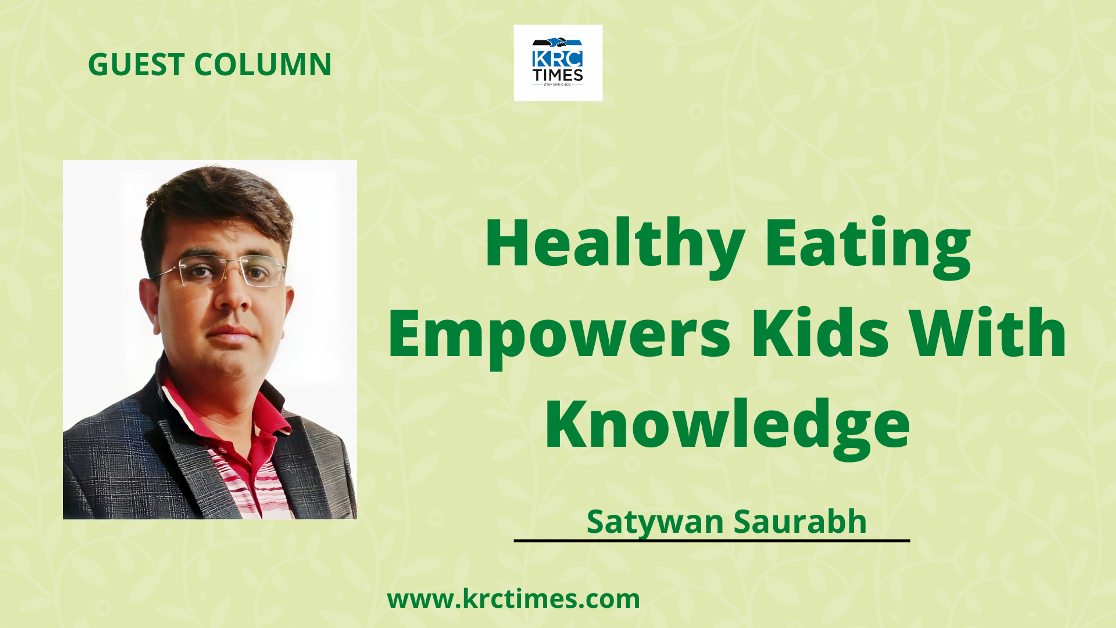With proper nutrition productivity increases, and a better future for the country is ensured
 Satywan Saurabh
Satywan Saurabh

Nutrition helps children grow well. And the brain develops. Right nutrition gives strength to fight diseases and does not fall sick again and again. It is only through nutrition that repeated illness can be avoided and freedom from the scope of malnutrition can also be found. Proper nutrition does not cause diseases, its effect is seen on a person’s life, productivity increases, the concentration of children increases, and the mind is engaged in studies. A better future for the country is ensured. Research shows that nutrition education can teach students to recognize how a healthy diet affects emotional well-being and how emotions can influence eating habits. School staff can consider ways to add nutrition education to an existing program.
An adequately balanced diet is important for a child’s survival, health and development. Well-nourished children are more likely to be healthy, productive, and ready to learn. Undernutrition has the opposite effect, stifling intelligence, reducing productivity, and perpetuating poverty. This increases the child’s chances of dying and increases their susceptibility to childhood infections such as pneumonia, diarrhea, and malaria. Undernutrition is caused by inadequate intake and/or inadequate absorption of energy, protein, or vitamins and minerals (micronutrients) which in turn lead to nutrient deficiencies.
Undernutrition is not just caused by not eating enough food. Childhood diseases, such as diarrhea or intestinal worm infestations, can affect nutrient absorption, or requirements. Malnutrition is a broad term that refers to all forms of poor nutrition. Simply put, malnutrition includes both undernutrition and overnutrition. Effective nutrition education in schools may eventually force children to rethink their eating habits and form new habits. Nutrition education offered in schools can go a long way in enhancing the health of children through better nutrition and physical activity in schools and at home. Nutrition helps children grow well. And the brain develops. Right nutrition gives strength to fight diseases and does not fall sick again and again. It is only through nutrition that repeated illness can be avoided and freedom from the scope of malnutrition can also be found. Proper nutrition does not cause disease, its effect is seen on a person’s life, productivity increases, the concentration of children increases, and the mind is engaged in studies. A better future for the country is ensured.

Diet diversity, frequency of meals, and minimum acceptable diet are three major indicators of nutritional deficiency in infants and young children. The data shows that with a higher level of schooling in the mother, the children received a better diet. Only 11.4% of children of mothers with no schooling received sufficiently varied food, while 31.8% of those whose mothers completed Class XII received a varied diet. But on the other hand, higher levels of education among mothers meant that their children had less frequent meals, perhaps because they were more likely to go to work and travel long distances to work. Investing in the first 1,000 days from conception to the child’s second birthday shapes the future of the nation. Ending stunting and other forms of undernutrition saves lives, improves health and prospects for children, and improves overall developmental progress. This makes the fight against malnutrition a national imperative.
Advertisement
We know how to end stunting and other forms of malnutrition. There are proven solutions that India implements today to improve nutrition for all – solutions that can spur growth and help break the cycle of poverty. Nutrition alone for the prevention and treatment of undernutrition Requires more attention than attention. It is equally important to improve access to safe water, promote sanitation, and prevent and treat diseases. Nutrition can be improved through social safety nets, social security schemes, and other poverty alleviation measures. Along with ending child marriage and avoiding teenage pregnancies, education is also important.

UNICEF supports the government’s efforts to reduce stunting and wasting among the most vulnerable populations. This is being done by universal coverage of proven high-impact interventions for adolescent girls and women – from conception to age two – around 1000 days. Special attention is given to geographical areas and social groups where nutrition indicators are well below the Indian and state averages. Improving feeding practices, especially complementary foods between 6 and 18 months of age, is also important. Social and behavior change initiatives, such as community-level counseling, dialogue, media engagement, and advocacy, to promote the use of locally available, nutrient-dense inexpensive foods for young children, especially in marginalized communities integral to. Because malnourished mothers are more likely to have malnourished children, UNICEF promotes complementary feeding plans for adolescent girls, pregnant women, and lactating mothers.
Healthy eating learning opportunities include nutrition education and other activities integrated into the school day that can provide children with the knowledge and skills to help them choose and consume healthy foods and beverages. Nutrition education is an important part of a comprehensive health education program and empowers children with the knowledge to make healthy food and drink choices. Students receive less than 8 hours of required nutrition education each school year, significantly less than the 40 to 50 hours required to effect behavior change. Additionally, the percentage of schools providing necessary instruction on nutrition and dietary behavior is also very low. Given the important role of diet in preventing chronic diseases and supporting good health, schools should ideally provide more hours of nutrition education instruction to students and involve teachers and parents in nutrition education activities. Research shows that nutrition education can teach students to recognize how a healthy diet affects emotional well-being and how emotions can influence eating habits. School staff can consider ways to add nutrition education to an existing program. We should never forget that-
Always get immense energy from nourishing food.
Pay attention to food and drink, and always think.
Do it with education, and proper arrangement of food.
Growing with nourishment with force, the contract of life.

Dr. Satyavan Saurabh, Research Scholar, Poet, Independent Journalist, and Columnist, All India Radio and TV Panelist. (Opinion expressed here are that of the author)
Advertisements | 5E For Success

KRC Career Membership Program is the first step toward an evolved career-building support system powered by KRC Foundation. Ideal for students and job seekers. Mail resume to- 5eforsuccess@gmail.com


